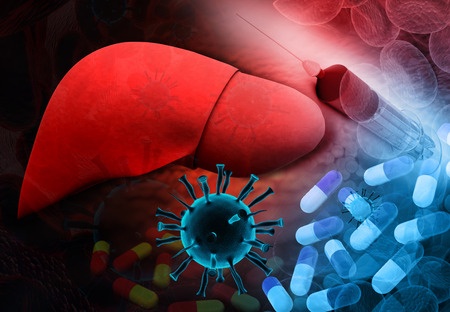What is Hepatitis C?
Hepatitis C is a virus that has a preference for infecting the liver. Technically it is a small RNA virus with six subtypes (genotypes 1-6) that make a difference to the course of disease and response to treatment.
How is Hepatitis C acquired?
The virus is acquired through blood or blood product transfusion in places where blood supply screening is not optimum. It is also acquired through intravenous injection such as intravenous drug abuse and by sexual intercourse.
What are the symptoms?
Acute Hepatitis C is a benign event and the vast majority are asymptomatic and have no jaundice. Fulminant Hepatitis C is rare.
What is the outcome?
The risk of chronic hepatitis is high, more than 70% of post transfusion infected patients. Hepatitis C is therefore usually diagnosed as chronic hepatitis rather than acute hepatitis. As with most chronic hepatitis patients (see other article), there are no symptoms until late in the disease when liver cirrhosis has occurred, leading to all its consequences such as un-wellness, accumulation of fluid in the abdominal cavity (ascites), bleeding from bloated veins in the oesophagus (bleeding oesophageal varices), infections, brain dysfunction from mild impairment to deep coma (encephalopathy) and liver cancer.
Can it be treated?
There was a time when there was no treatment for Hepatitis C. Then it transpired that a combination of a natural protein called interferon (especially the long acting pegelated interferon) together with an antiviral agent call Ribavirin, over one to two years depending on the genotype, could effect a cure. But (as discussed in treatment of Hepatitis B), interferons had terrible side effects and the rate of cure was not very high. Better cure rates were achieved by “triple therapy” with the Peg-Interferon, Ribavirin plus one more drug (Boceprevir or Teleprevir) but this combination was shown to be very toxic with many serious side effects including dropping of the red blood count and platelet count to dangerous levels. This has since been all but abandoned.
Lately, a number of new antivirals have been developed, targeting different parts of the virus genome. Different combinations of these oral medicines have been found to be very effective in curing Hepatitis C in all its genotypes. The side effect profile is also very good and the drugs are well tolerated. However these new drugs tend to be very expensive. Drug names include Simeprevir, Daclastavir, Sofosbuvir, Ledesprevir, Obmitasvir, Paritaprevir, Ritonavir, and newer generations of drugs are still in the pipeline. The use of different combinations of such drugs requires analysis of the genotypes and the clinical situation of patients and patients should be under the care of specialists.
Can I vaccinate against it?
Unfortunately there is as yet no vaccine available against Hepatitis C.





